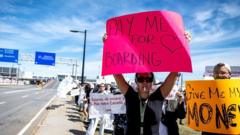Boeing's Missouri and Illinois operations came to a standstill early Monday as over 3,200 defence workers initiated a strike following their union's rejection of the company's recent contract offer addressing pay, work schedules, and pensions. This strike primarily involves workers who manufacture F-15 fighter jets and other military aircraft at Boeing's defence hub.
Dan Gillian, Vice President of Boeing's Air Dominance division, expressed disappointment over the rejection of an offer that included an average wage increase of 40%. "We believe this was a fair offer, and we're focused on continuing to address the needs of our employees," Gillian stated.
The strike is spearheaded by a local chapter of the International Association of Machinists and Aerospace Workers (IAM) based in St. Louis, which noted, "3,200 highly-skilled IAM Union members at Boeing went on strike at midnight because enough is enough. This is about respect and dignity, not empty promises." IAM is one of the largest unions in the U.S., representing about 600,000 workers across aerospace, defence, shipbuilding, and manufacturing sectors.
This marks the first strike at Boeing's defence operations since 1996. However, in a recent statement, Boeing's CEO Kelly Ortberg downplayed the impact of this strike on the company's operations, suggesting it would be less disruptive than last year's significant strike involving around 30,000 passenger jet workers, which resulted in substantial financial losses for the company.
Boeing has been navigating a turbulent period in recent years, grappling with various crises, including two fatal plane crashes and other safety concerns. The Boeing 737 had seen a dramatic mid-flight incident in 2024 when part of a panel detached from an emergency exit. The company's output has also plummeted, delivering only 348 aircraft last year, the lowest since the onset of the pandemic.
As Boeing faces ongoing challenges, analysts wonder if this latest strike might be a turning point in restoring worker relations and addressing deeper issues within the company.
Dan Gillian, Vice President of Boeing's Air Dominance division, expressed disappointment over the rejection of an offer that included an average wage increase of 40%. "We believe this was a fair offer, and we're focused on continuing to address the needs of our employees," Gillian stated.
The strike is spearheaded by a local chapter of the International Association of Machinists and Aerospace Workers (IAM) based in St. Louis, which noted, "3,200 highly-skilled IAM Union members at Boeing went on strike at midnight because enough is enough. This is about respect and dignity, not empty promises." IAM is one of the largest unions in the U.S., representing about 600,000 workers across aerospace, defence, shipbuilding, and manufacturing sectors.
This marks the first strike at Boeing's defence operations since 1996. However, in a recent statement, Boeing's CEO Kelly Ortberg downplayed the impact of this strike on the company's operations, suggesting it would be less disruptive than last year's significant strike involving around 30,000 passenger jet workers, which resulted in substantial financial losses for the company.
Boeing has been navigating a turbulent period in recent years, grappling with various crises, including two fatal plane crashes and other safety concerns. The Boeing 737 had seen a dramatic mid-flight incident in 2024 when part of a panel detached from an emergency exit. The company's output has also plummeted, delivering only 348 aircraft last year, the lowest since the onset of the pandemic.
As Boeing faces ongoing challenges, analysts wonder if this latest strike might be a turning point in restoring worker relations and addressing deeper issues within the company.


















